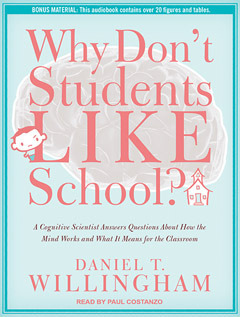What do you think?
Rate this book


Audiobook
First published March 16, 2009
I’ve gone into a lot of detail about the visual-auditory-kinesthetic theory because it is so widely believed, even though psychologists know that the theory is not right. What I have said about this theory goes for all of the other cognitive styles theories as well. The best you can say about any of them is that the evidence is mixed.
If your method reaches only the attentive student, then you must either invent new methods or call yourself a failure.
This generalization—that experts have abstract knowledge of problem types but novices do not—seems to be true of teachers too. When confronted with a classroom management problem, novice teachers typically jump right into trying to solve the problem, but experts first seek to define the problem, gathering more information if necessary. Thus expert teachers have knowledge of different types of classroom management problems.